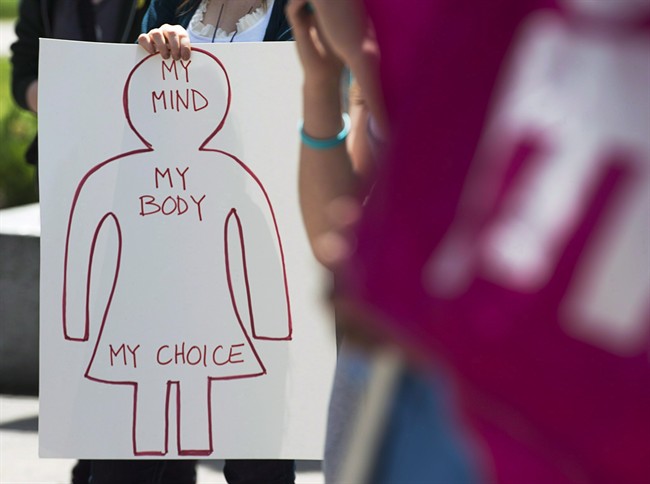Canadian attitudes toward abortion appear to be shifting, according to a new Ipsos poll, as six in ten say abortion should be permitted whenever a woman decides she wants.

The Ipsos poll, given exclusively to Global News, found 57 per cent of Canadians endorse a women’s right to choose – up almost 10 points from 2015 and up from 36 per cent from when the question was asked in 1998.
Twenty-one per cent of respondents believe abortion “should be permitted in certain circumstances” like cases involving rape, while eight per cent believe it “should not be permitted under any circumstances except when the life of the mother is in danger.” Three per cent of respondents think abortion “should never be permitted, no matter what circumstance exists.”
WATCH: Minister of Health says she’ll ensure the provinces improve abortion access

READ MORE: Navigating Canada’s abortion provider patchwork
Eighteen to 34-year-olds are the most likely to be pro-choice, with 63 per cent agreeing a woman should have the right to choose.
Looking at the regional breakdowns, the poll found residents in Manitoba and Saskatchewan are most likely to be pro-choice followed by those in BC (66 per cent), Quebec (64 per cent).
Residents in Atlantic Canada (55 per cent), Ontario (51 per cent) and Alberta (47 per cent) were more evenly split when it comes to abortion.
The poll, which also weighed public opinion on the issue in 23 countries around the world, found the people most likely to be pro-choice are residents of Sweden (84 per cent), followed by France (69 per cent), Great Britain (62 per cent), Hungary (62 per cent) and Turkey (60 per cent).
The least progressive are Peru (11 per cent), Brazil (16 per cent) and Mexico (25 per cent), according to the poll.
Christabelle Sethna, an associate professor with the Institute of Women’s Studies at the University of Ottawa, says the shift in public opinion in Canada is a positive for young women.
“Canadians are taking into consideration how difficult it is for a woman to carry a pregnancy to term that she does not want,” Sethna said. “It allows for women to make more choices in their reproductive lives.”
41 per cent of Americans are pro-choice
But while Canadian attitudes appear to be shifting in one direction, fierce debate over the issue of abortion has been reignited in the U. S. as several states have taken the controversial step to defund access to reproductive health services provided by organizations like Planned Parenthood.
On Sunday, Ohio passed a bill that effectively cut about $1.3 million in funding for Planned Parenthood in the state. The bill signed by Ohio governor and Republican presidential contender John Kasich prevents the state from contracting health services with any organization that performs or promotes abortions.
READ MORE: Where can you get an abortion? It’s a secret
Provider patchwork: How abortion access varies across Canada
How the ‘abortion pill’ Mifegymiso could change reproductive health
Rebecca Cook, a law professor in the International Reproductive and Sexual Health Law Program at the University of Toronto, says the abortion debate has become a “political football.”
“As parties want to get the far right vote or the more evangelical vote they introduce bills that defund Planned Parenthood or restrict access or availability to abortion,” said Cook, pointing to Texas’ strict abortion laws.
Abortion access in Canada
Global News has reported on abortion access in Canada as it varies depending on where you live.
Currently an abortion access advocacy group is suing the provincial government of Prince Edward Island, the only province in Canada with no abortion access at all.
“Just because abortion is legal doesn’t mean it’s accessible,” said Sethna. “There is regional variation because of the concentration or lack of concentration of hospitals and clinics that provide abortion services.”
The federal government’s recent approval of Mifegymiso, a combination of mifepristone and misoprostol better known as RU-486, could also lead to greater abortion access in Canada.
The so-called “abortion pill” has been accessible to women in France and the U.K. for more than two decades, while the U.S. has had access since the early 2002.
It is expected to begin its formal rollout sometime in 2016.
Exclusive Global News Ipsos polls are protected by copyright. The information and/or data may only be rebroadcast or republished with full and proper credit and attribution to “Global News Ipsos.” This poll was conducted between Jan. 22 and Feb. 5 2016, with a sample of 1,002 Canadians from Ipsos’ online panel and is accurate to within +/ – 3.5 percentage points 19 times out of 20.





Comments